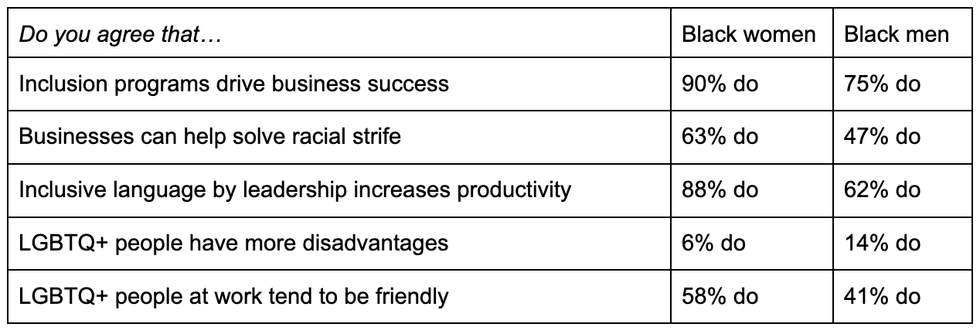Annual investment in diversity, equity, and inclusion initiatives in the United States is now estimated at over $20 billion. In the past two years alone, businesses have pledged more than $200 billion in additional funding toward racial equity initiatives specifically.
But despite the scale of these commitments, companies are often still left wondering about the impact of their DEI investments. Demonstrating results from DEI efforts is especially important when considering the Black experience in today’s workplace. For Black Americans at work, how do we measure what progress is actually being made to recruit and retain Black talent? How do Black workers feel about their company’s inclusion efforts? And what kind of ROI are companies receiving for their DEI work?
For Black workers, the value of DEI is substantial when it comes to recruitment, retention, and salary. Yet, a lingering high risk of lawsuits over discrimination indicates companies have a long way to go. These findings — and what to do about them — were the focus of Black Americans: Action-Based Metrics for Executive Leadership, a comprehensive new report co-sponsored by PowerToFly as part of the Inclusion@Work Annual Report Series. Created in partnership with co-sponsors Prisca, APCO Worldwide, Novartis, MMCA, Acend, and Urban League of Greater San Francisco Bay Area, and based on a wider survey of 1,255 U.S. workers, including 217 Black workers, the report reveals important findings about the current value, perceptions, and risks of DEI for Black workers in 2023. Read on for five of the core findings of our research — and action items for addressing those findings — below.
Finding #1: A Gap in Perceptions of the Problem Exists
It’s not surprising that a clear disparity exists between how Black people view the effects of race in the workplace versus how White people view them. Our research highlights this gap in perception and helps illustrate the way that Black Americans at work struggle with multiple inequities at a time.
“The survey shows that from the perspective of many Black American workers, the situation is comparable to that of Sisyphus pushing a boulder up Mount Kilimanjaro.”
- Black Americans: Action-Based Metrics for Executive Leadership
One in three Black workers, more than any other ethnic group, feel race is relevant in how they are treated at work. For Black respondents, the third most important issue at work was “race relations.” For White respondents, it ranked dead last.
Over 54% of Black workers feel they face more disadvantages than other groups. Meanwhile, only 17% of White workers feel Black workers have more disadvantages. Asian/Pacific Islander respondents (22%) and Hispanic respondents (18%) were both more likely than White respondents to rank Black people as facing more disadvantages in the workplace than any other group.
DEI solutions are also seen in a different light. Our research found that 83% of Black people, more than any other racial/ethnic group, view these efforts as an important factor in their company’s success. A smaller percentage (61%) of White workers view DEI programs as a driver of success, and nearly 1 in 3 White respondents went so far as to call DEI initiatives a distraction.
Finding #2: Black Workers are Not a Monolith in How They View Inclusion
When it comes to policies and perceptions about DEI, Black people are not a monolith. Not all members of a community think the same, and intersectionality plays a significant part in how Black workers experience disadvantages and perceive solutions. Our study also showed that Black people’s attitudes towards inclusion vary by gender and age.
Gender is a factor. Black women are firm believers in DEI programs, inclusive language, and the effect companies can have on their community. Black men believe the revenue impact of a company culture with poor DEI is more significant than Black women. Here’s how else the two groups vary in their opinions:
Age is a factor. Younger Black workers (ages 18-29) respond with more pronounced intensity to both positive and negative DEI efforts, while older Black workers are less responsive to DEI programs in general.
Of all the age groups, younger Black workers feel that Black people have more disadvantages at work (79%). Younger Black workers are also more likely to agree that there is trust and respect between workers of other backgrounds at their company (73%), compared with 30 to 44 year olds (61%) and 45 to 60 year olds (53%) — suggesting that, for some Black workers, the belief they’re likely to be met with trust and respect at work may erode over time and after exposure to hostile and/or discriminatory work cultures. Younger Black workers place the highest value, literally and figuratively, on inclusion in the workplace, saying a 50% improvement in inclusion would be the same value to them as a 14% pay raise.
Other individual factors. Black workers have nuanced, critical views of themselves when it comes to race and DEI at work. The Black workers we surveyed have a dichotomous view of inclusion efforts: 46% feel inclusion training makes companies stronger, while 50% feel this training leaves companies no different or weaker; of that 50%, it’s worth noting that just 9% currently have DEI programs available in their workplaces.
A gap also appeared in whether Black workers feel able to discuss race in their workplaces. About one in three Black workers (31%) feel their Black colleagues do not discuss race, with 24% saying they themselves don’t feel comfortable discussing race in the workplace. (Lower-income Black workers were more likely to indicate discomfort than middle- and high-income Black workers.) Meanwhile, our research found that Black workers are >77% more likely to stay longer at companies where they feel comfortable speaking about race, compared to companies where they don’t.
This research also reminds us that Black workers have different education, experiences, and views. DEI policy solutions for Black workers must keep the complexities of age, gender, and other intersectionalities in mind.
Finding #3: The Value of DEI is Proven High, Particularly in Recruitment and Retention
DEI leaders want to establish a return on investment for their efforts. Our study revealed that the ROI for DEI can be calculated through revenue loss, salary equivalents, and the cost of replacing Black workers who leave.
Black workers place high value on DEI efforts at work. For Black workers at companies that already have Black employee resource groups (ERGs) and/or DEI programs, that value was especially clear: 95% said they’re more likely to stay longer at companies with inclusion policies, compared to 79% of non-Black workers at companies with these policies and programs. Meanwhile, over 62% of Black workers say that racial issues are currently costing their company money, valuing that loss at about 9% of company revenue.
Perceived value is high. To prove out the concrete, tangible value of DEI, we asked Black workers to explain the value they attribute to DEI programs within the framework of a pay increase. Three in four Black workers feel a 50% improvement in their workplace’s racial climate would, literally, be worth something to them, valuing the impact of that improvement at the equivalent of 12% pay increase. Higher-income Black workers (earning $150,000+) place the highest value on improving racial climates, saying it would be worth a 16% pay increase. Additionally, Black workers at smaller companies (50-249 employees) are more likely than those at large companies to place a literal value on improving the racial climate at work.
Real impact. Our research found that the greatest returns on investment in DEI were seen in recruitment and retention. Black workers at companies with ERGs, business resource groups (BRGs), or DEI programs were ~50% more likely to say there was trust and respect between employees from different backgrounds at work. And Black workers are likelier to stay, on average, about 45% longer at companies with DEI programs than they would have otherwise, our research showed.
Finding #4: The Risk of Lawsuits Remains High
A tough question that executive leaders want answered: how much DEI (or lack thereof) risk exists in my company right now? Our study found that an alarmingly high percentage of Black workers have had to consider lawsuits related to discrimination based on their identity or background. In fact, one in four Black workers have considered a lawsuit because of the way they were treated at work.
About 27% of all Black respondents have thought about or talked about filing a lawsuit against a current or former employer. Younger Black workers are very likely (49%) to have considered filing a lawsuit, and Black men are also 2.5x more likely to consider a lawsuit than Black women.
The U.S. Equal Employment Opportunity Commission (EEOC) estimates the average settlement for workplace discrimination lawsuits at $40,000, with one in 10 cases settling at $1 million. The average cost of litigation is $160,000. This is simply another way of looking at the importance of not only implementing DEI programs and policies, but making sure you’re doing so effectively, reducing the risk of discrimination against all underrepresented groups as a result.
Finding #5: Black Workers are Watching to See Whether Leaders Take Action
The persistent message of our research is that many Black workers are frustrated with the results of DEI efforts at their company. They also feel underrepresented when it comes to decision-making about DEI.
26% of Black workers say their company does not address diversity-related concerns in a way that is meaningful to them.
Some 44% of Black workers felt they were underrepresented in DEI leadership, while 44% felt they were underrepresented as speakers and trainers in DEI initiatives. Over the last year, one in five Black workers say that the racial climate at work neither got better nor worse.
That said, Black workers generally feel that businesses can have a positive effect on their community. About 55% of Black workers agreed with the statement: “Overall, business has the ability to improve issues around racial strife in our community.” Black workers at large companies (>1,000 employees) are especially inclined to agree with this statement (80%). The opportunity to move beyond net neutral and see true progress on racial climate in the workplace is there.
Black Workers are Hopeful — If Leadership Can Adapt
Black workers place a high value on positive advancements toward inclusion — and they perceive an equally high cost with ineffective DEI efforts. Overall, the research demonstrates that Black workers are hopeful businesses can improve racial strife in their communities. But they see a lack of Black leadership in DEI programs, and they don’t accept these programs at face value without results. That’s especially true of lower-income Black workers. That group was also more likely (31%) than middle-income Black workers (17%) to agree that their company and its leadership team were not addressing DEI-related concerns in a way that was meaningful for them.









